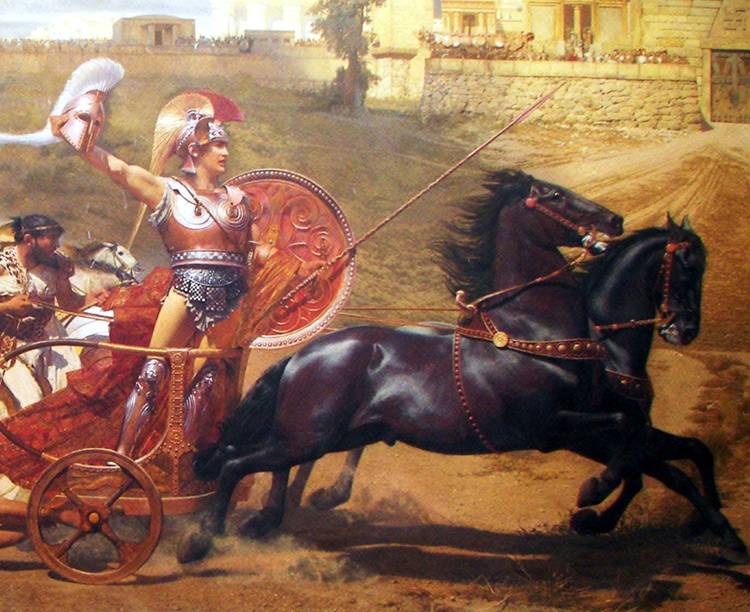Current Events Lesson Plan: December 29, 2016 – January 4, 2017
Current Event: Mythic Monday: the Warrior Achilles
Achilles was a Greek warrior in the Trojan War, a war fought between Greece and the city of Troy. The events in Achilles’s life are legends but may have some historical basis. Achilles was the son of Peleus, the king of Phthia in Thessaly, and Thetis, an immortal sea nymph. Soon after Achilles was born, Thetis dipped him in the River Styx, whose water would make him invulnerable, like a god. However, the immortalizing water did not touch the heel by which Thetis held him. Homer’s epic poem Iliad, which tells of the final year of the Trojan War, describes Achilles as the mightiest warrior in all of Greece. But his pride, vanity, and overwhelming desire for glory in battle also made him stubborn, petty, brutish, and easily angered. Achilles felt he was not being adequately rewarded for his services and refused to fight any longer in the war. After his closest friend, Patroclus, was killed, Achilles returned to battle. The Trojan War went on, then, and Achilles soon met his demise. According to legend, one of the Trojans shot an arrow into Achilles’s heel, and Achilles died from the wound.

This painting, The Triumph of Achilles, is in the Achilleion, a palace dedicated to Achilles on the Greek island of Corfu. Credit: The Triumph of Achilles (1892), by Franz von Matsch; Achilleion Palace
Objective:
The Trojan War was a conflict in which ancient Greece defeated the city of Troy. The legend of the war inspired many leading works of classical literature. Some of the events that occurred during and after the Trojan War became the subject of three great epic poems—the Iliad and the Odyssey, attributed to the Greek poet Homer, and the Aeneid by the Roman poet Virgil. Scholars do not agree about the truth behind the legend of the Trojan War. Some of them believe it distorts and exaggerates small conflicts involving the Greeks from about 1500 to 1200 B.C. Others think the legend is based on one great war, which most say probably took place about 1200 B.C. The Homeric epics combine historical material of different times with fictional material. As a result, the works are not reliable historical documents. But archaeologists have found historical evidence in the ruins of Troy and other places that confirms certain events described in the epics. The Behind the Headlines news story and related World Book articles explore the Trojan War and other topics related to the war.
Words to know:
- Achilles
- Agamemnon
- Ancient Greece
- Greek literature
- Hector
- Heinrich Schliemann
- Helen of Troy
- Homer
- Iliad
- Mythology
- Odyssey
- Paris
- Styx
- Trojan War
- Troy
Discussion Topics:
1. Ask your students if they can name gods and goddesses from Greek mythology. (Students might say Aphrodite, Apollo, Ares, Artemis, Athena, Atlas, Cronus, Dionysus, Hades, Hera, Hermes, Poseidon, Prometheus, Uranus, Zeus.) Also, see if they can name some other characters, besides Achilles, from Greek mythology. (Students might name Adonis, Aeneas, Charon, Helen of Troy, Hercules, Jason, Medusa, Midas, Oedipus, Pandora, Pegasus, Perseus, Phoenix, Theseus, Ulysses [Odysseus].)
2. Ask your students what their favorite book is and why.
3. Ask your students if they would rather live in ancient Greece (or any other ancient civilization) or in modern times. Have them explain why.
4. Ask your students to use World Book’s Timelines feature to view or add to the History of Ancient Greece timeline. (Students may wish to use World Book’s “Ancient Greece” article for help.)


